In Defense of Unimpressive Persons
Devra Torres | Apr 26, 2012 | 13 cmts
Why eight children?
Because we're personalists.
Let me explain.
After all, with Earth Day just past, our family might strike even sympathetic people as too much of a good thing (and less sympathetic ones as sheer insanity).
But to us, as personalists, the main thing about our eighth child, Gabe,

is not: "Oh, no! Eight! Too high a number!"
Likewise, we utterly miss the point about little Danica Camacho (whose name means "morning star")
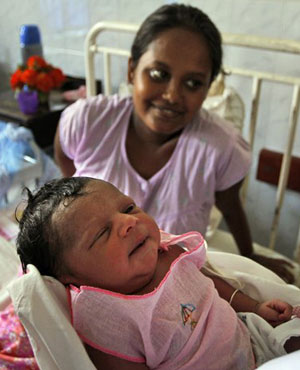
if we say "Oh, no! Seven billion! WAY too high a number!"
(Danica's mother clearly knows better: you can see it in her eyes.)
Since persons are not things, you can count them, but you can't quantify them. Since they are not products, you are deeply misguided if you wish to screen them for quality control, even if they have Down's...
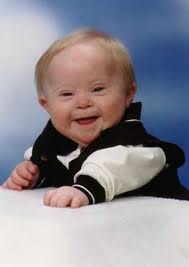
...and even if their parents' income isn't up to the rarified standards of middle-class American consumers.
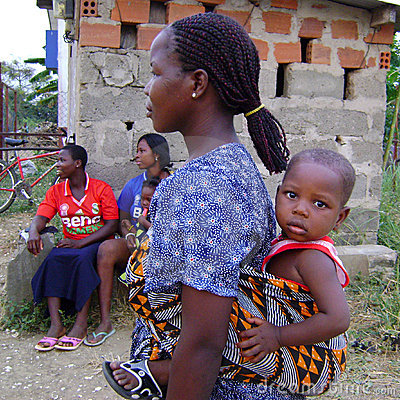
Those who think the essence of a person consists of something as external as his numerical relation to others are deeply misguided. They're hostage to what my beloved physics professor, Dr. Donald Cowan (former president of the University of Dallas), used to call "the myth of fact." Our faith in statistics and empirical data is just as blind and naive as the simplest tribesman's belief in his local rain god. To bureaucrats suffering from this malady, abstractions are far more real than Gabe or Danica. Only if you can put a number on them do they count as real. In fact, people's measurable aspects are the most important thing about them. Statistics will tell you all you need to know.

Let's see: here's a ten-pound Hispanic/Ashkenazi male neonate, eighth living child of middle-class American parents. Over there's a southeast Asian female, 5.5 pounds, second child of a low-income Filipino couple.
There's always something that the statistics can't capture, though. My husband says he could identify each of our babies' personalities from the moment of birth (and he was at my side every time, so he would know).
This one kind of laid low. He looked like he wasn't so sure about the move to the outside world....
That one opened her mouth wide and started hollering right away....
Sure enough, the former turned out to be a more circumspect young man, the latter a more, well, commanding young lady. (But I'll leave it at that: readers acquainted with my children are earnestly instructed to refrain from guessing which might be which.)
All eight of them, and all seven billion of us, are persons, not objects. "Reproduction," with its shades of widgets, mass production and quality control, is a singularly inadequate description of what goes into making of one of us.
Please don't misunderstand: personalists do realize that marveling at the unrepeatability of each of us is no substitute for seeking out how best to feed, heal and educate us all. But before you count and evaluate and plan for the welfare of these beings, you ought to give a thought to what, exactly, they are. Mother Teresa, a very practical woman, was on to something when she said the idea of there being too many children was like saying there were too many flowers in the field, too many stars in the sky.

This degree of cluelessness is right up there with the influential ignoramus character in Amadeus, the film about Mozart, who criticized one of the composer's symphonies as having "too many notes."

So lots of antinatalist arguments are misguided. They're burdened with ignorance of the problem of underpopulation, and with gullibility about the politically motivated myths surrounding the state of the environment. I don't propose to debunk antinatalism in this brief blogpost: I'll limit myself to referring you to Julian Simon on macro-antinatalism ("The world is overpopulated!") and to Simcha Fisher on micro-antinatalism ("Your household is overpopulated!").
What I'd like to address is this: there are certain pronatalist arguments that are fine as far as they go--but also miss the point.
First, there's the public-good argument: We need lots of babies to constitute our tax base. We want younger, able-bodied working people to outnumber the elderly. But birth control and abortion artificially shrink that base and enlarge the proportion of retirees. The security we wish for our elders is impossible with too small a labor force.

Frustrated propoents of this argument have been known to make cracks about how it is, after all, their own children who will end up supporting the very same intentionally childless elderly who despise their prolific ways.

Second, there's the Johann Sebastian argument: the very person whose life is being prevented or cut short might have turned out be the next Bach (who was his parents' eighth), or the one to discover the cure for cancer, or some other exceptionally interesting or useful specimen of humanity. To screen him out simply for the crime of being baby number eight, or number seven billion, would have deprived us all of something irreplaceable. This is unquestionably true.
(In fact, Margaret Sanger, the oxymoronic "mother of birth control," was the sixth of eleven children. This creates a bit of a conundrum for her admirers. As number six, she clearly shouldn't have come into existence in the first place. But if she hadn't, she wouldn't have been able to help all those other mothers to escape their children's existence.)

Then there's a similar variant: the Otis argument, against the idea that women in hardship would be better off preventing or aborting their offspring. For example, what if you were married to a sharecropper who was developing tuberculosis? What if you'd have to be the sole breadwinner, living in a housing project, until your child could drop out of school to work as a well-digger and gas station attendant, and then die tragically in his twenties? This was Otis Redding's mother a few decades ago. An Otis-less world is a dreary thought.
So take care, the reasoning goes, lest we, in our ignorance, interfere with the existence, or lifespan, of someone especially "important."
All these arguments have merit. Of course an economy needs a healthy number of babies, and of course you don't want to deprive the human race of someone extraordinary. But none of them gets to the heart of the matter. None is sufficiently personalist.
Our intrinsic value does not hinge on our contribution to the common good, or on the presence of unusual abilities. Abortion would remain objectively evil even if it were true that Roe v. Wade brought about a drop in violent crime by eliminating future criminals.
But what about those babies whose future just doesn't bode well? Aren't we being a little cavalier here?
My friend, "Annie," put it best:
"I made a mistake. This baby is not a mistake."
She'd gotten pregnant right after high school. She married the father, but they divorced shortly afterwards. She married again, an alcoholic this time, and had two more children. Then she divorced again, and spent the next few decades trying to raise her kids between exhausting shifts at the nursing home. Her eldest, Stevie, ended up in a home for troubled boys, where she supervised his supervisors as closely and relentlessly as she could, never giving up on him. I've lost touch with Annie, and I don't know how he turned out.
Chances that he'll be a world-famous artist or expert in anything, though, are small indeed. Chances that he'll even be a productive member of society, as these things are measured economically, are slim, too. So do we have sufficient data to ascertain that Stevie was a mistake? Isn't there still something repugnant about that idea?
One of the most disquieting things that ever happened to me was during a prenatal doctor's visit about four years ago. I used to make a point of looking respectable and sounding articulate during these appointments, the better to demolish any lurking stereotypes about large families and the grand multiparas who preside over them. This time I succeeded: my earrings matched my shirt. My hair was being unusually cooperative. My slacks may even have been ironed. I spoke in calm and friendly tones, with lots of big words.
And it worked. The doctor, gazing at me in surprise, confided that she wished more people like me would have eight kids, instead of, you know...other types.
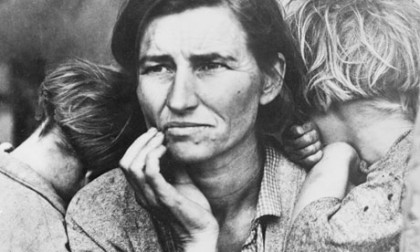
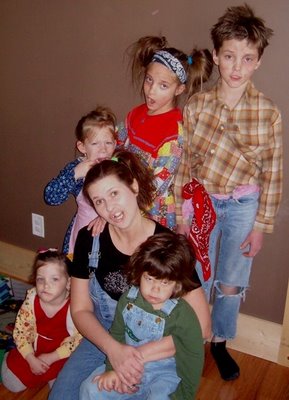
She probably just meant that she wished, as I do, that all mothers had the educational opportunities and economic resources that she assumed I had (yes, lady, I have a master's degree, but no, that designer maternity shirt was picked up at a thrift store, and I've now handed it down to my sister for her umpteenth pregnancy, the better to mislead her unsuspecting ob/gyn). But she clearly considered me one of the "fit." I wished she hadn't said it.
Because fit or unfit, eight babies are something to rejoice about. So are seven billion. Not en masse, but one by one. Not because they're "human resources," or because they might turn out to be something special, but just because they're unrepeatable and unique, conceived in the mind of an all-wise God and then made incarnate in time and space, embarking on the adventure of a life of free will among billions of other creatures as mindboggling as themselves. That we can't always see it that way says less about the value of persons than it does about the limits of our minds and the stinginess of our hearts.
So, no apologies.
And happy Earth Day!

Comments (13)
Rosie Herreid
Apr 26, 2012 8:14pm
Thanks for pointing out what has been bothering me about the "Bach argument"! I see what they're saying, but it's almost playing right into the hands of the pro-aborts; because I'm sure a lot of them would love to have a way of knowing if a particular unborn baby _is_ the next Bach, because then they could have a reason for protecting that one, and not one who wasn't.
I love your opening point, too, about seeing a person first as a person and not as a relative number. It's very easy to get caught up in focusing too much on the externals. I think people see this very easily when they're talking about children who are "already here;" for instance, someone who was worried about overpopulation and famine in Africa wouldn't suggest killing off starving African children; but they need to realize that a baby in the womb is "already here" too.
Devra Torres
Apr 26, 2012 8:26pm
Thank you, Rosie! So many minefields with this subject--first, that it's just been addressed SO many times; then, that I hate to pick a fight with fellow pronatalists; then, too, that I do realize that lots of good people are honestly concerned for people living in awful poverty, and that's why they're horrified by the "7 billion" number. I just don't like the whole eugenicist feel of any argument that says babies of "exceptional quality" should be spared!
Katie van Schaijik
Apr 27, 2012 9:14am
Devra, I've been pondering your post for two days, in combination two others stories in the news: one about the "squalid conditions" in the "octomom's" house (she's the single mother who's had 14 children through in vitro fertilization, including 8 at once), and the other about a woman suing a Catholic school for firing her over her decision to pursue in vitro fertilization.
I'm thinking about these lines:
...and how it not only advances a "pro-natalist" view, but also a pro-linking-conception-to-sex-in-marriage view. It is anti-in-vitro, which has an inescapable tendency to treat children as products rather than gifts.
I'm also thinking a lot--but this will be stuff for a separate post--about individuals and numbers. I mean about how there does, mysteriously, seem to be at least a respect in which we can speak of "too many" children, though we'd have to do it with infinite care not to lose sight of the metaphysical priority of the individual over the group.
Devra Torres
Apr 27, 2012 2:03pm
Katie, I see what you mean! I've been pondering the in vitro case, too. It's all very mysterious: on the one hand, God's design for human beings is that they should come into existence through the procreation of a married couple. So it seems as if you could state it as a syllogism:
IVF, or fornication, or any number of Artificial Reproduction Techniques, ought not be practiced.
This baby was born as a result of one of these.
Therefore, it was not God's will for this baby to exist (or, therefore, this baby is one too many).
But that leaves out the idea of "felix culpa"--which, I know, is not very amenable to syllogisms...but what do we make of it exactly?
I would also be reluctant to speak of "too many children" but don't really have an agument agaisnt it, except that God really can bring good from evil. Clearly, you can say that some ways of "producing" children should not exist, but does it follow that those children shouldn't exist? It does seem to, which makes me think there's something about God's ways that I'm not understanding (oops,nearing word limit)...
Devra Torres
Apr 27, 2012 2:11pm
...which is extremely plausible!
One thing seems clear: for ourselves, we should focus on doing what is objectively right--in this area as in all others. When looking at others--like the little boy I met once who was conceived by AID (artificial insemination by anonymous donor), we can know that the means by which they were conceived may have been horrible and evil, but that they are no less loved by God, and I think we could also say no less willed by God, given that He didn't have to make it possible for conception to occur via such means, but He did.
OK, clearly this needs some more mulling over.
Katie van Schaijik
Apr 27, 2012 2:58pm
I agree absolutely and whole-heartedly that each and every person is willed into existence by God's infinite love and sovereign desire, including even those children conceived through evil acts, like rape and incest, or IVF (which I don't put on the same level as the other two). And, in that sense, it is impossible to speak of any such thing as "too many children".
And yet, when I look at the "octomom" (who actually has 14 very young children, all conceived artificially, and no husband) or at the couple I heard about this week who are expecting sextuplets through IVF, I can't help but feel oppressed by a sense that this is not as it should be. Those children cannot be getting what they are really owed. The natural design of human sexuality (plus experience of the challenges involved in loving and caring and providing for my own children) leads me to think that there are limits on our capacity to parent well.
But you're right. It needs more mulling.
Devra Torres
Apr 27, 2012 4:08pm
Katie, I agree: it's not as it should be, and these chldren are not growing up in family life the way it was designed. There are limits to "parenting capacity," for sure--I run into them every day. God designed human babies to be helpless and dependent to an unheard-of extent and for a uniquely long time, compared to all other creatures, as far as I understand. There's a reason we don't have "litters" of children, or didn't usually, until we invented IVF.
Of course, there are a lot of decisions parents make that produce situations where children aren't getting what they need, where the parents are not able to do a good job at bringing them up. Children grow up fatherless or in poverty, or just without enough attention or supervision--everything from imperfect to tragic, because of original sin. But IVF and similar artificial techniques are different: intentionally choosing to bring someone into existence by a means that ought not exist.
As in so many areas, it strikes me that only the Church has a coherent set of principles for even beginning to address this whole mysterious subject--getting beyond emotional reactions to both the parents' infertility and the children's hardship.
Douglas Ryan VanBenthuysen
Apr 29, 2012 9:27pm
This article reminds me of a sign at the Seattle Zoo that my son Mauricio and I used to look at when he was about three. The sign was counting up the world population, and counting down the amount of land per person. The population number steadily went every couple of seconds, and, though the rhetoric of the surrounding overpopulation warning signs clearly indicated that this upward tick was to be lamented, he and I would stand there, and yes I was being self-consciously defiant, and say “Yay! Another baby!” Over and over again.
The importance of celebrating population growth is particular important for the two of us; my son was adopted out of foster care when he was three, and the conditions of his birth would have made him one of the first candidates to have been snuffed from existence for the sake of keeping down the population. Anyone who has met him knows that would have been a horrible, horrible thing.
Devra Torres
Apr 29, 2012 10:24pm
Douglas, I love that story! It reminds me of when my mother (and Simcha's) saw a bumper sticker saying "If you can't feed 'em, don't breed 'em" and followed the driver all over town honking at him all the way.
Stephen Granderson
Apr 29, 2012 11:21pm
As number eight of nine, I suppose I would also have been "eliminated." I'm certainly glad the proponents of population control didn't have their way in my case!
One thing that I have never understood is why people often say that you should only have two or three children so that you can "raise them like human beings," as if parents couldn't possibly provide enough time or love for more children. My father worked hard, and my mother was kept very busy with nine children, but I never felt any sense of neglect or rivalry for my parent's affections. My parents gave plenty of time and love to each of us, and all my brothers and sisters just added to the general family affection. I often felt (and still feel) genuinely sorry for those poor kids who didn't have so many great siblings.
Granted, someone who is living in desperate poverty or working twelve hours a day might have trouble providing for or spending time with ten children, but then they would probably have almost as much difficulty with one. In fact, additional children would probably make things easier for the parents once they got to a certain age.
Devra Torres
Apr 30, 2012 10:20am
Stephen, thanks for coming over to the blog! I guess the idea is: let's make it possible for people all over the world, including the very many who really are living in desperate poverty, to have an experience like yours--and like mine, too. I'm going to try to address that subject in a couple days. I'm the oldest of eight, and I enjoy my brothers and sisters more all the time, and am very, very glad my parents were brave or crazy enough to keep going,
Katie van Schaijik
Apr 30, 2012 10:41am
I love big families. I think the Church has a "preferential love" for the them, just as she does for the poor. But, I think it's important not to suggest that all parents are capable of raising a big family well. I have met several good and serious Catholics over the years who say they did suffer neglect as children, because their parents were overwhelmed.
Sometimes having lots of children is a display of courage and generosity and great love, but not always. It can also come from irresponsibility, or misunderstanding of Church teaching.
Though every baby is infinitely valuable, it doesn't follow that more is always better. If it were, how could NFP ever be justified? If it were, why would the Church not urge young Catholics to get married as soon as possible rather than waiting until we meet someone we love?
These are difficult things to talk about, but important I think.
Devra Torres
Apr 30, 2012 11:06am
Yes--any prayers you all would like to send up for my attempts to address these questions gratefully accepted!